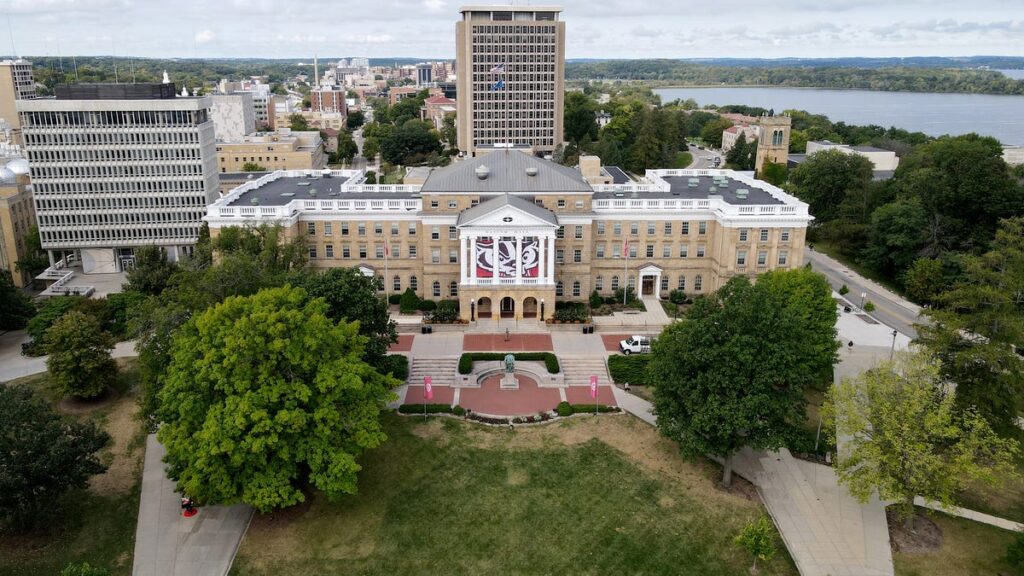
An aerial view of Camp Randall Stadium in Madison, Wis.
An aerial view of Camp Randall Stadium in Madison, Wis., home of the Wisconsin Badgers.
- The review of UW-Madison’s diversity office found excessive spending and atypical salary boosts.
- The report will likely fuel further debate about the value of DEI programs
- UW-Madison made several changes to increase financial oversight and accountability of unit leaders.
The University of Wisconsin-Madison’s chief diversity officer made a series of poor financial decisions, including approving substantial salary increases and authorizing excessive travel spending, according to newly released records that shed light on the employee’s demotion earlier this year.
The decisions by LaVar Charleston throughout 2023 and 2024 coincided with a period of intense scrutiny by state Republican lawmakers over the value of campus diversity offices. In one of the most brazen examples cited in the report, Charleston approved bonuses for 85% of his employees just three days after UW leaders struck a sweeping budget deal with legislative leaders that had stalled for months over DEI.
“It strains credulity to believe that he did not grasp the acute sensitivity of this action,” the internal UW-Madison report said. “This lack of communication and timing demonstrates a significant lapse in judgment and fiscal responsiblity.”
The findings released Friday are sure to fuel critics of DEI, who see diversity, equity and inclusion efforts as financially wasteful and racially divisive. And the timing is less than ideal for the UW System. The GOP-controlled Legislature will vote on the UW budget for the next two years in just a few months.
The UW-Madison report concluded the university’s decentralized organization led to a lack of oversight that enabled Charleston’s poor decision-making. UW-Madison has made several changes to increase financial accountability.
“We believe this was an isolated case, and as we dug into that more, we saw this was clearly an outlier in (spending),” UW-Madison chief financial officer Rob Cramer said in an interview. “We do take very seriously our responsibility to the state and to taxpayers and donors. When we find an issue like this, we try and take swift action.”
UW-Madison diversity office under scrutiny
Charleston led the the university’s Division of Diversity, Equity and Education Achievement since 2021. The office offers student-focused support programs and fosters a welcoming culture on campus. DEI advocates say the work is critical in helping students and employees who have historically been left out of higher education, including Black and Brown students, veterans and those with disabilities.
UW-Madison removed Charleston from his leadership position in January. He remains employed at the university through his faculty appointment. His salary was cut from about $324,000 to $133,000. The university said he is on voluntary paid leave through April 10.
Charleston did not return a request for comment Friday. But he defended his decisions in a memo to Chancellor Jennifer Mnookin. He said he was encouraged by Cramer and the former UW-Madison provost to spend down the surpluses that had accumulated in his division from unfilled vacancies in previous years. Among the hundreds of records released were at least two memos outlining the division’s plan to spend more money.
The review began last fall when UW-Madison said it conducted budget reviews of several units, including Charleston’s division. The nonpartisan Legislative Audit Bureau also dove into the financial data, spurred by Republican lawmakers who requested an audit of diversity efforts across state agencies.
Charleston’s division had a $21.8 million budget as of last school year, Cramer said. Most of the spending questioned in the report came from a fund that is a mix of state taxpayer and tuition money.
Cramer declined to speculate on whether the division’s budget or employee base may shrink in the future. He said the report was strictly a review of the divisions’ financial activities, making no judgment on the effectiveness of its programs.
UW diversity division approved bonuses for most staff
Charleston’s decisions did not violate state laws or university policies but demonstrated a lack of judgment, records released to the Journal Sentinel show.
Across UW-Madison, for example, less than 3% of employees annually receive bonuses. In Charleston’s division, he approved bonuses to 85% of his staff without consulting senior leadership, the report said. The bonuses totaled nearly $219,000 and came four days after the UW System brokered a deal with the Legislature in late 2023.
The overwhelming majority of the bonuses amounted to more than 3% of employees’ base salaries, straying from the more modest bonuses other units distributed. In addition, more than half of the division’s 71 employees had already received a bonus in the previous year.
La Var Chaleston increased employee salaries without justification
Between Dec. 1, 2023, and Nov. 30, 2024, Charleston also approved salary increases ranging from 10% to 23% for 12 employees.
Charleston told UW-Madison officials conducting the review he awarded the raises for equity reasons. But he provided no information on market pressures or pay of employees with similar appointments to justify the increases. The raises were also processed as performance adjustments, not equity adjustments.
Charleston suggested the university’s central finance office endorsed his compensation decisions because the office processed the transactions, an assertion the report rejected. While the central office provides guidelines and recommendations on salary decisions, responsibility lies with the unit leader.
UW diversity division’s spending on travel, events, furniture spiked
The report said Charleston’s division spent the most on travel, training and events of any unit on campus — about $11,000 per employee in 2024. Other divisions averaged about $3,300 per employee.
Travel and event spending rose sharply compared to previous years. The division spent $1.2 million in 2019. This ballooned to $1.7 million in 2023 and $2.65 million in 2024.
Supply spending also increased, from $326,00 in 2019 to nearly $600,000 in both 2023 and 2024. Some of the expenses were questionable, the report said.
Among the charges: $18,000 for student massage therapy services, $21,000 for a senior leadership retreat at a Lake Geneva resort, $14,000 for Maui lodging costs for seven students and staff for recruitment purposes.
“The collective total amounts to unacceptable action by a Vice Chancellor,” Cramer wrote in a report to Mnookin this week.
UW-Madison increases financial oversight and accountability
As a sprawling and complex enterprise with 20,000-plus employees and more than 50,000 students, UW-Madison has a long history of decentralization. This organizational structure allows units to be more responsive to their own distinct needs. But it comes with risks, as Charleston’s case shows.
The division did not go over its budget. What paved the way for the spending was a practice allowing units to carry over unspent funds into the next year. Before Charleston took over the division, the unit had underspent, in part because of unfilled vacancies in the division. This led to the accumulation of large carry-over balances he could then tap.
Beginning this fiscal year, UW-Madison units can carry over only 10% of unspent money. The rest will go to a fund controlled by central administration.
Among other changes outlined in the report:
- All vice chancellors are now required to consult with the chief human resources officer on compensation decisions outside of normal, approved ranges. This includes any raises exceeding 10% of an employee’s base salary and bonuses exceeding $5,000.
- Unit finance leads will now dually report to their unit leader and to the associate vice chancellor for finance.
- Workday, a new financial software system expected to launch this summer, will improve internal controls.
- Deloitte, an outside financial firm, will conduct a review.
(This story was updated to add new information and a video.)
Kelly Meyerhofer covers higher education in Wisconsin. Contact her at kmeyerhofer@gannett.com or 414-223-5168. Follow her on X (Twitter) at @KellyMeyerhofer.

